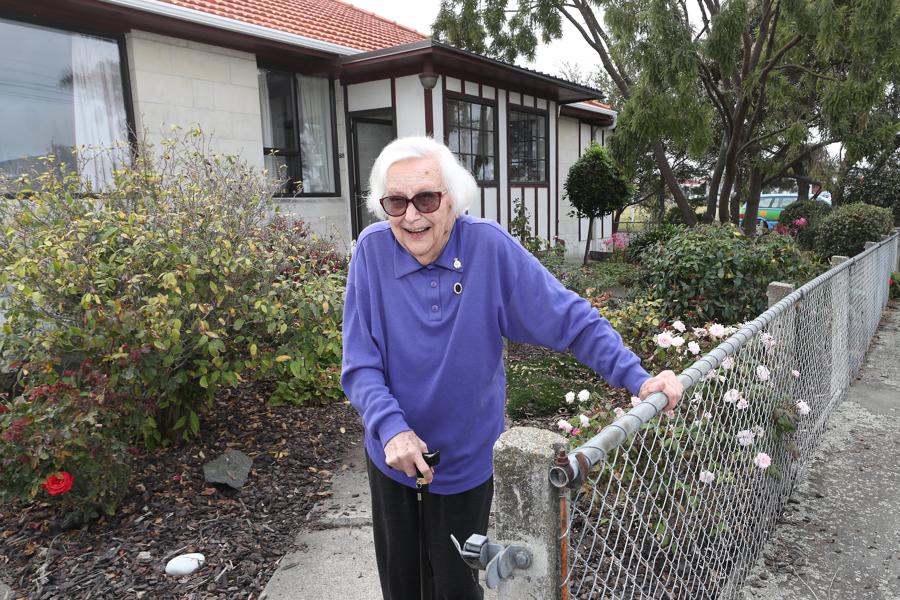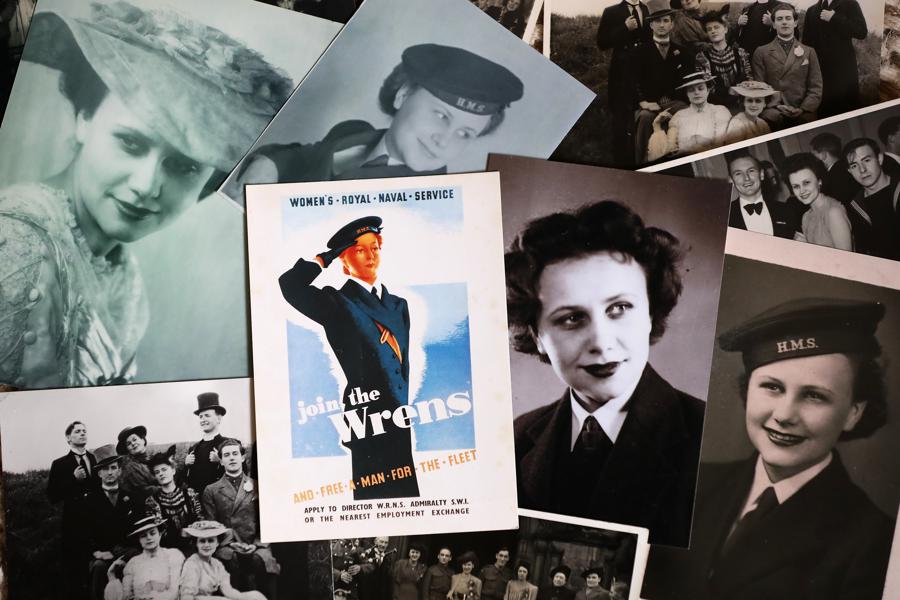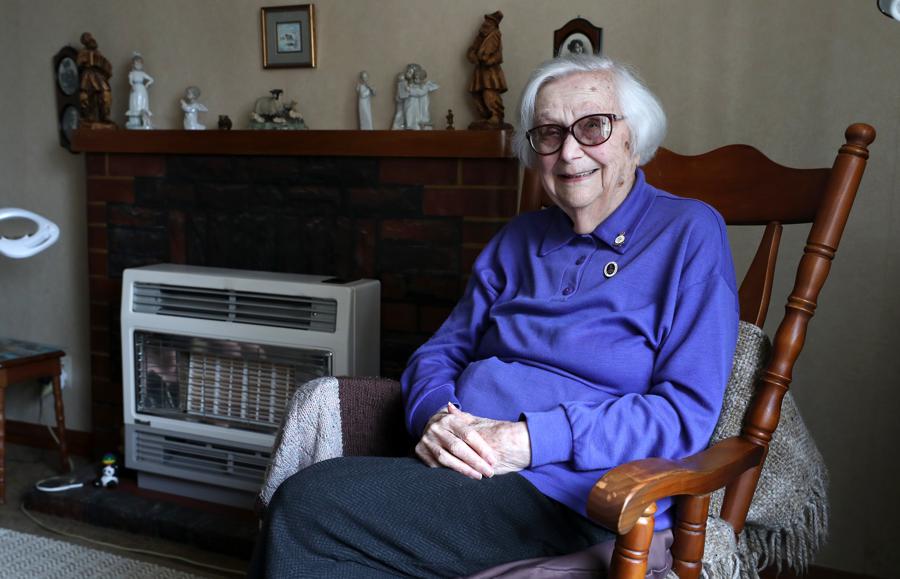In Honour
June Blakey
Oamaru veteran acted, danced, sang for the troops during WWII
A photograph of Oamaru veteran June Blakey still hangs in the Scottish performing arts centre where she entertained troops passing through the Orkney Islands during World War II.
I was very keen to get back to normal.
The 96-year-oldwoman was just 18 when she joined the Women’s Royal Naval Service (the Wrens) in 1943, doing clerical work until budding British actor and wartime sweetheart Donald Hewlett drew her into the entertainment industry.
“I quite enjoyed performing,” Blakey, originally of England’s Northumberland, told Stuff.
Hewlett, who went on to star in television comedy It Ain’t Half Hot Mum from 1974 to 1981, was a founding member of the Kirkwall Arts Club while stationed in Orkney – recruiting Blakey to act, dance, and sing for soldiers and civilians.
“They were a really great crowd,” she said.
Blakey, whose year-long romance with Hewlett began with a picnic for two, said her photograph still graces the wall of the club.
“I got a great reception whenever I went back to Orkney.”
Other famousfaces people Blakey met during her wartime performing career were actors Laurence Olivier and Kenneth Connor, and actress Sybil Thorndike.
One of Blakey's most vivid memories of her time on stage was the audience’s roar of laughter when she delivered the Hewlett-penned line, “I have come on the wings of a raven”, and learning later the words referred to a “mishap” at the base.
“A plane took off with this guy draped over the tail. He was thinking of jumping off before he fell unconscious,” she said.
“The guy managed to survive.”

Blakey's war service between 1943 and 1945 involved entertaining the troops passing through the Orkney Islands. PHOTO: JOHN BISSET | STUFF
Of her experience dating rising star Hewlett, Blakey jokingly remarked: “He loved himself.”
Blakey was inspired to join the war effort by her uncle, who fought in Gallipoli with the Royal Navy during World War I.
“He had a bit of a hard time,” she said.
Her time with the Wrens, spent with 20 women to one Nissen hut, was “reasonably peaceful” because – while Scapa Flow, a body of water in Orkney, was hotly contested at the start of the war – the battlefront had shifted away by the time she was old enough to enlist.
He cut in on this young pilot who was dancing with me and said, ‘You don’t want to dance with him. He’s just a learner, I’m an instructor’.
Orkney was not completely without conflict. When the German battleship Tirpitz was spotted in the fjords, soldiers in the area were assigned to a bombing mission to combat the vessel – getting drunk to calm their nerves before heading out.

Blakey has kept numerous photos from her time with the Wrens. PHOTO: JOHN BISSET | STUFF
Blakey was in charge of logging the amount of alcohol each soldier consumed, deciding to “slip the entries in bit-by-bit throughout the week, to make sure it doesn’t look like they’re drinking too much”.
After the commanding officer did his weekly check of the record, he called Blakey into his office and remarked: “The men are so clever. They’ve been out to sea for a week, but they’re still drinking in our mess.”
Blakey got her nickname, Panda, from the commander.
“The commanding officer asked someone in the squadron what he was up to, he said he was taking me out, and the reply was, ‘Is she the one that looks like a panda?’ It stuck.”

Blakey as a character from the Oscar Wilde play The Importance of Being Earnest during the war. PHOTO: JOHN BISSET | STUFF
Blakey admitted to being “a bit naughty” during her service, recalling the time an air raid siren went off while she was in the middle of brewing a cup of tea, so she decided to keep stirring.
“Everybody on camp had done it. The commander was absolutely furious.”
She was reassigned to England town Halesworth in 1945, when the Wrens were no longer needed in Orkney. There, she met her husband – Phil Blakey, an instructor for the Royal Navy's Fleet Air Arm, from Yorkshire – at a dance.
“He cut in on this young pilot who was dancing with me and said, ‘You don’t want to dance with him. He’s just a learner, I’m an instructor’.”
After the war, Blakey’s husband remained with the navy and the newly-weds travelled from base to base around Britain. He took part in the flyover for Queen Elizabeth II’s coronation in 1953, before retiring from service and moving to New Zealand in 1958.
“I was very keen to get back to normal,” she said.

Blakey, originally of England’s Northumberland, moved to Oamaru in 1958. PHOTO: JOHN BISSET | STUFF
The couple settled in Oamaru and had four children, with five grandchildren and a great-grandson following.
Blakey, who did theatre as a schoolgirl, continued in the entertainment business long after the war.
She had been part of the Oamaru Repertory Society almost since its inception, recruited by a friend who watched her in church drama productions in 1959. She roped her husband, who passed away in 2016, and the rest of her family into painting sets and doing other odd-jobs for the society.
A plane took off with this guy draped over the tail. He was thinking of jumping off before he fell unconscious.
She helped raise money for the society to purchase its own 100-seat theatre, and gave her final performance just a few years ago.
Orkney has always been close to Blakey – not only because many of the streets in nearby Palmerston borrow their names from the islands, but because of the numerous times she has sat down with family and friends to share her many adventures with the Wrens.
Back to top